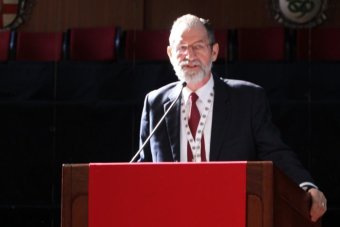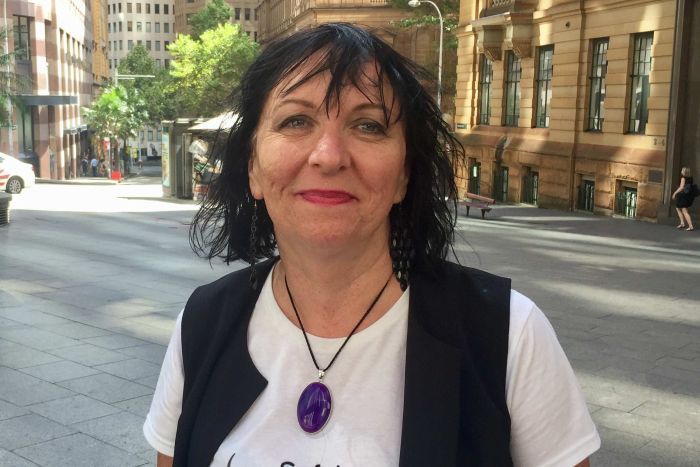Uniting Church Apologises to Victims of Sexual Abuse, Jehovah's Witnesses Defend Treatment
By Nicole Chettle and Michelle Brown
The Uniting Church in Australia has apologised to children sexually abused in its congregations and institutions, while Jehovah's Witness seniors have defended their two-witness rule and shunning of victims. The statement from the president of the church's General Assembly Stuart McMillan came during evidence to the Royal Commission into Institutional Responses to Child Sexual Abuse. Mr McMillan said "we are, and I am deeply sorry that we didn't protect and care in accordance with our Christian values for those children". "... I want to acknowledge the impact that it's had in the lives of those young people, and to say I'm truly sorry." Addressing the abused directly, Mr McMillan committed the church's leaders to making amends and stopping future abuse occurring. "We pledge ourselves to continue to understand and to implement the lessons that we've learnt through this royal commission," Mr McMillan said. Mr McMillan was part of a panel of church officials who on Friday outlined in detail the steps the church had taken to improve its child safety policies. Two-witness rule puts burden on Jehovah's Witness victims The royal commission is also looking at how the Jehovah's Witnesses responded to recommendations made after the hearing involving survivors of abuse in July 2015. The church has 67,000 followers in Australia across more than 800 congregations. The commission heard the church hierarchy, based in the United States, declined to appear in person or via video link and counsel assisting told the inquiry that was a matter of "considerable regret". However, two senior members of the Jehovah's Witnesses in Australia were questioned on a number of issues including changes that mean victims are no longer forced to confront their abuser, and the church's refusal to change rules requiring two witnesses if an offender refuses to confess. Terrence O'Brien, a member of the Jehovah's Witness branch committee and director of the Watchtower Bible and Tract Society of Australia, faced intense questioning from the chair of the commission, Justice Peter McClellan, who said the two witness rule was distressing for victims. Justice McLellan: "If the organisation doesn't acknowledge that they were abused, that imposes a great burden on them, doesn't it?" Mr O'Brien: "We don't disbelieve a person who makes an accusation. That's why we investigate every accusation brought forward by the elders." Justice McLellan: "Yes, but if there are not two witnesses you don't accept it, do you?" Mr O'Brien: "Because scripturally we're not able to." Counsel assisting Angus Stewart SC said the Jehovah's Witness law was "silent" on whether a child could be represented by someone other than a parent during an internal investigation. The 2015 hearing involved evidence from a woman whose father, a high-ranking church official, abused her. The commission was told that since that hearing, 17 allegations of child sexual abuse had emerged and 15 were reported to police. The remaining two did not proceed at the request of the now adult victims. Mr Stewart told the commission that since 2015, the commission had received more than 1,165 items of correspondence relating to the Jehovah's Witnesses and Watchtower Australia from all over the world criticising their response to child sexual abuse. Jehovah's Witnesses 'shun victims due to scripture'
Counsel assisting said many people in the Jehovah's Witness church suffered the "particularly devastating" practice of shunning, should they choose to leave the organisation as a result of their abuse. Rodney Spinks is a Jehovah's Witness and member of the service department of the Watchtower Bible and Tract Society of Australia and was asked why shunning was seen as necessary. Justice McLellan: "Why can't they keep having social contact with those people who happen to remain in the organisation?...Why is it necessary for the organisation to tell all of its adherents 'you must shun this person'?" Mr Spinks: "Because the individual has taken the decision to no longer associate, or to no longer be involved with congregation activities... they've taken the decision to say: 'I'm shunning the congregation'." Justice McLellan: "They still want to have their friends and family... why is it necessary that everyone else must now shun them?" Counsel assisting, Angus Stewart: "The real answer is because you say the bible says so. That's the answer, isn't it?" Mr O'Brien: "Yes, that's our understanding of the scriptural disfellowshipping disassociation doctrine. Speaking outside the commission, survivor Robyn Cameron said the whole system needed an overhaul. Ms Cameron was born into a Jehovah's Witnesses family, and from age three to 13 she was prostituted by her father. She said when she told the church she did not want to be a part of the congregation any more they told all Jehovah's Witnesses in Tasmania to shun her. "Do they know what it feels like to completely lose your identity, community and family?" "[Today] they said 'we never shun a victim' and I wanted to stand up and say 'what about me?' "I sat here for two hours hearing them lie... I had to hold myself down so much." Ms Cameron said the commission has been integral to opening people's eyes and the public needs to no longer see Jehovah's Witnesses as "door knockers who don't have blood transfusions". "In our experience they are the worst of all those who have been to the royal commission," he said.
|
.
Any original material on these pages is copyright © BishopAccountability.org 2004. Reproduce freely with attribution.

